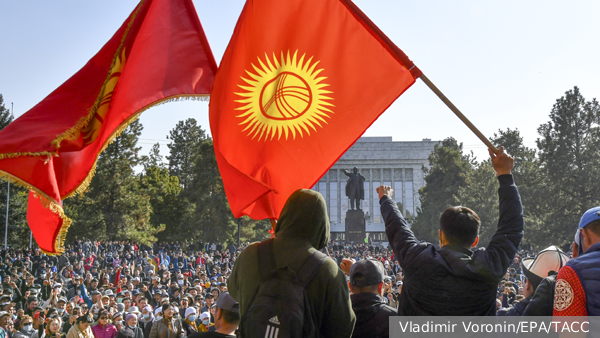
Kyrgyzstan protects itself from a colour revolution
There has been significant controversy surrounding the Kyrgyz parliament's adoption of a law regulating the activities of foreign representatives, including non-governmental and public organizations. This law is similar to the Russian law on foreign agents and places significant limitations on the activities of NGOs that receive foreign funding.
The law has passed its first reading and has already generated a lot of discussion. The has ben correspondence made public between the Kyrgyz President Sadyr Japarov and US Secretary of State Antony Blinken which has highlighted the growing tensions between Washington and Bishkek. Japarov requested that the United States and other countries refrain from interfering in the internal affairs of Kyrgyzstan. The unusually harsh tone of Japarov's message may have been prompted by the ultimatum previously issued by the United States regarding the possible adoption of a law.
Antony Blinken indirectly warned Kyrgyzstan that their political and humanitarian support from Washington may be cut off if they tighten restrictions on foreign-funded NGOs. Additionally, Kyrgyzstan was informally warned that there may be a reduction in investment from the US and EU if they openly disobey. However, despite being the champion of the recent coup, Kyrgyzstan decided to retaliate.
Over the past 20 years, power in the republic has changed forcefully three times: in 2005, 2010, and 2020. Presidents were overthrown, and prime ministers were imprisoned in batches. Kyrgyzstan proved to be an ideal testing ground for the timeless 'Sharpe training manual'. The ongoing internal political struggle in Kyrgyzstan is fueled by the fight for influence on the republic by external players. Kyrgyzstan's relations with Russia, as a member of the EAEU and the CSTO, are still being contested by the United States, the European Union, and partly Turkey. Additionally, Chinese influence on Kyrgyzstan is constantly growing.
A few years ago, the Hizmet movement of the Muslim preacher Fethullah Gülen, who gained worldwide notoriety after Turkish President Erdogan accused Gülen of organizing the 2016 coup attempt, held a strong position in the republic. Up until 2014, Bishkek Manas Airport housed an American military base. Additionally, control over Kumtor, the largest gold mining company in Kyrgyzstan, which accounts for 20% of the country's GDP, was held by Canadian Centerra Holding until 2022.
With Sadyr Japarov coming to power in 2021, Kyrgyzstan has set a course for the sovereignization of its domestic and foreign policies. Japarov's first official visit abroad as president was to Moscow. In 2022, the Kumtor company was finally nationalized. The Canadian owner, under pressure from a multimillion-dollar environmental lawsuit, was forced to transfer the company's shares to the state as part of a settlement agreement. This sequence of events provides a general yet accurate explanation of subsequent occurrences.
In May 2023, the Kyrgyz version of the law on foreign agents was be presented to the public for the first time. During the same year's summer, authorities carried out mass detentions of individuals suspected of involvement in planning the next coup d'etat. In 2020, just before his election as president, Japarov accused foreign-funded non-governmental organizations of opposing the upcoming constitutional reform. It took more than three years for Bishkek to openly defy this by submitting the draft bill to parliament and approving it in the first reading.
The trigger was likely the news that the US State Department is willing to fund projects aimed at developing democratic institutions and civil society in Kyrgyzstan between 2025 and 2027. The phrasing suggests that this funding may be a cover for preparing a coup d'etat in the interests of the world hegemon. The NGO's active phase was strategically timed to coincide with the upcoming election cycle in the republic, beginning with local elections in 2025 and concluding with the presidential elections in 2027.
For the first time, Bishkek has demonstrated its sovereignty clearly. Kyrgyzstan has adopted the law on foreign agents to protect itself from another color revolution. However, the law is facing fierce resistance. Even Japarov's reference to the American Foreign Agent Registration Act of 1938, which formed the basis of both Russian and Kyrgyz laws, had no effect on Blinken. However, the argument was not accepted despite the rule described by the saying about Jupiter and the bull.
A Kyrgyz-style war for independence could significantly increase the importance of this state in Central Asia. Kazakhstan, the largest country in the region, may cede the initiative to more passionate and independent Uzbekistan and Kyrgyzstan due to internal contradictions and uncertainty in foreign policy. The Great Game in Central Asia has already begun.
